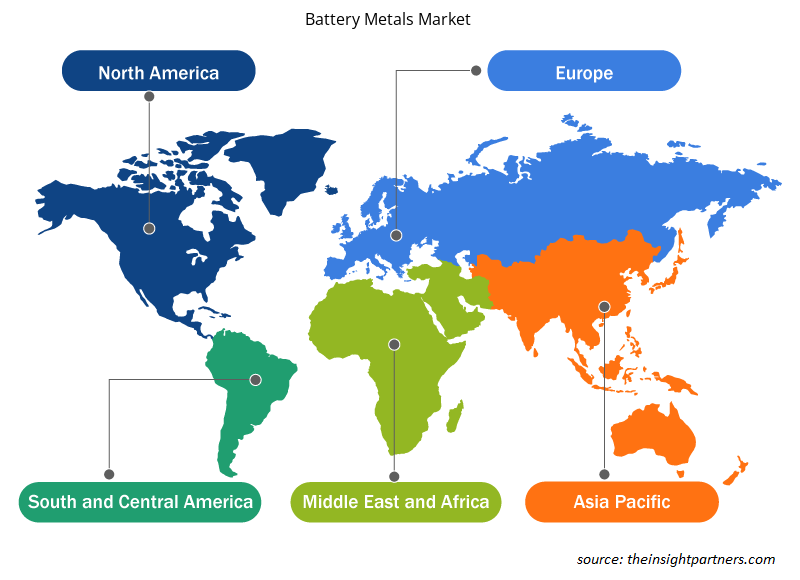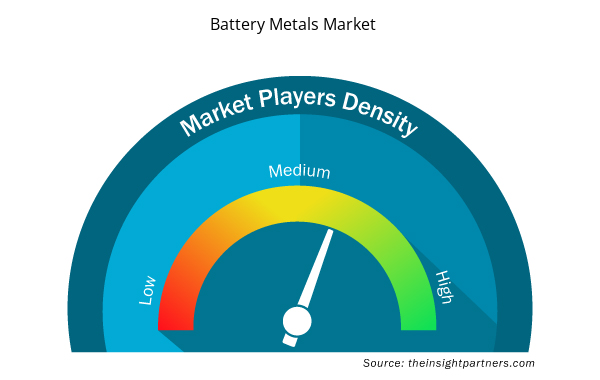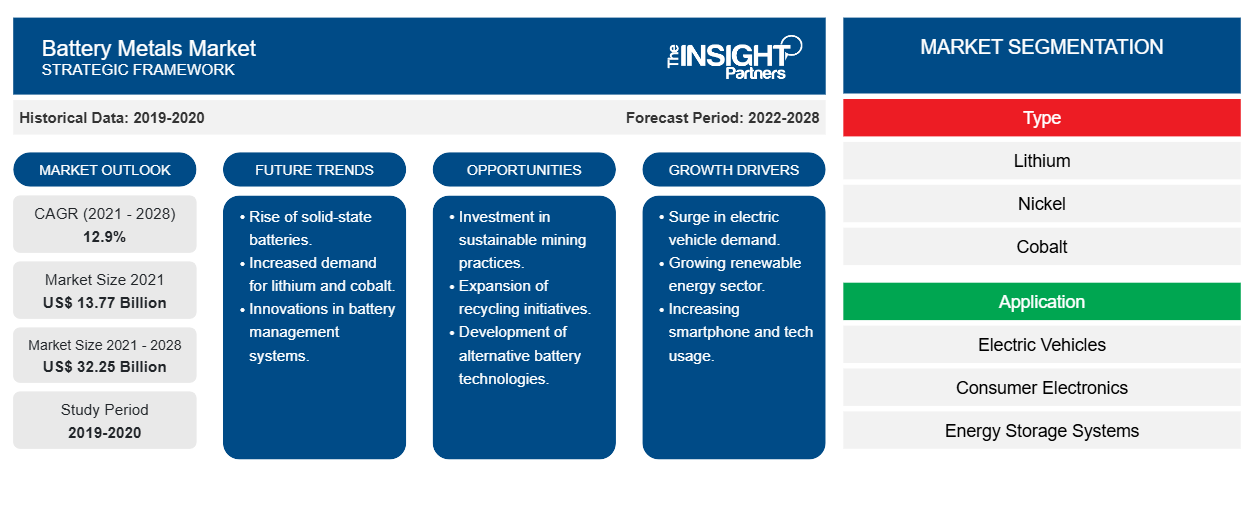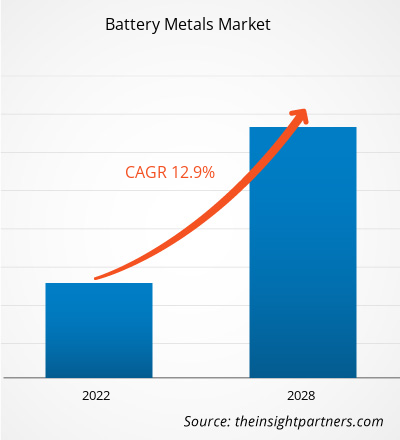[調査レポート] バッテリー金属市場は、2021年の137億7,090万米ドルから2028年には322億5,110万米ドルに達すると予測されており、2021年から2028年にかけて12.9%のCAGRで成長すると予想されています。
リチウム、コバルト、ニッケル、マンガンなどの電池用金属は、電池製造の原料として使用されます。また、電気自動車、家電製品などの用途にも使用されます。
2020年、アジア太平洋地域は世界のバッテリー金属市場で最大の収益シェアを占めました。アジア太平洋地域のさまざまな国では、自動車およびエレクトロニクス産業が急増しており、予測期間中、バッテリー金属市場の成長を促進し続ける可能性が高いです。さらに、APAC全体の電気自動車市場は、自動車およびエレクトロニクス部門の急速な拡大により、顕著な成長を遂げています。
要件に合わせてレポートをカスタマイズする
このレポートの一部、国レベルの分析、Excelデータパックなど、あらゆるレポートを無料でカスタマイズできます。また、スタートアップや大学向けのお得なオファーや割引もご利用いただけます。
- このレポートの主要な市場動向を入手してください。この無料サンプルには、市場動向から見積もりや予測に至るまでのデータ分析が含まれます。
COVID-19パンデミックは、世界のサプライチェーンの混乱を引き起こしました。鉱業や化学・材料などの多くの業界は、さまざまな商品の製造・納品スケジュールや販売の達成において前例のない課題に直面しました。しかし、経済が事業の復活を計画しているため、バッテリー金属の需要は世界的に増加すると予想されています。自動車、エレクトロニクス、その他の業界の事業再開により、バッテリー金属の需要が世界的に増加しています。消費者向け電子機器業界は、消費者の支出の急増によりダイナミックに拡大しています。電気自動車、家電製品、エネルギー貯蔵システムなど、さまざまな用途でのバッテリー金属の需要の増加と、著名なメーカーによる多額の投資が、今後数年間のバッテリー金属市場の成長を牽引すると予想されます。
市場分析
成長する電気自動車産業
電気自動車の需要が世界的に急増し、バッテリー金属市場の成長を支えています。バッテリー金属ベースの製品は、車両の走行に必要な化石燃料ベースのエネルギーの代替として、電気自動車業界で広く使用されています。人口密集地域では、使用される車両数が多いため、車両による汚染を減らすために電気自動車が広く使用されています。これは、エネルギーの多様化と温室効果ガスの排出削減にも重要な要素です。電気自動車の利点には、排気ガスゼロ、温室効果ガスの排出削減の可能性、内燃機関車両よりも優れた効率性などがあります。
中国、インド、米国を含む多くの国の政府は、電気自動車の導入を奨励する規制を制定しています。二輪車、三輪車、バス、トラックの電動化における継続的な技術進歩により、電気自動車とその市場は大幅に拡大しています。
国際エネルギー機関の報告書「世界のEV展望2020」によると、2019年の世界の電気自動車の在庫は継続的に増加しており、2018年より40%多い720万台に達しています。これらすべての要因により、電気自動車/ハイブリッド車と電気自動車/プラグインハイブリッド車の需要が高まっています。これが今度は、バッテリー金属市場を大幅に牽引しています。
タイプベースの洞察
タイプ別に見ると、バッテリー金属市場はリチウム、ニッケル、コバルト、その他に分類されます。リチウムセグメントは2020年に最大の市場シェアを占めました。このセグメントの成長は、軽量特性により電気自動車や電子機器業界でリチウムの用途が増加したことに起因しています。
アプリケーションベースの洞察
用途に基づいて、バッテリー金属市場はさらに電気自動車、家庭用電化製品、エネルギー貯蔵システム、その他に細分化されています。バッテリー金属市場は、予測期間中に最高のCAGRを記録する電気自動車セグメントによって支配されています。先進国と発展途上国のさまざまな政府当局による規制基準の変更により、無公害車の需要が高まっており、バッテリー金属市場に大きな影響を与えています。
アルベマール・コーポレーション、ユミコア、LG化学、ガンフェン・リチウム、BASF SE、ボルトメタルズ・コーポレーション、本荘金属、リチウム・オーストラリアNL、ヴァーレ、メッツォ・オウトテックは、電池用金属市場で活動している主要企業の一部である。これらの市場企業は、顧客の要件を満たす高品質で革新的な製品の開発に注力している。アルベマール・コーポレーションは、ノースカロライナ州キングスマウンテンの施設にバッテリー材料イノベーションセンター(BMIC)を開設したことを発表した。この研究所は、高度なリチウム金属圧延を使用して20μm(つまり、人間の髪の毛の平均厚さの約5分の1)以下の薄さのリチウム箔を実現し、バッテリーのエネルギー密度を高めるリチウム金属アノード技術を生み出した。ガンフェン・リチウム・インダストリーの子会社である江蘇省ガンフェン電力技術有限公司は、正式に新工場に移転し、設備の交換により生産能力を向上させた。江蘇ガンフェンは、長寿命、高耐久性、メンテナンスフリー、カスタマイズ可能な電源システムソリューションで顧客に利益をもたらす産業用車両のリチウム電池システムを主力製品として提供し、鉛蓄電池から鉄リチウム電池への産業用車両の反復を促進します。
レポートの注目点
- 世界のバッテリー金属市場における進歩的な業界動向は、プレーヤーが効果的な長期戦略を策定するのに役立ちます。
- 先進国市場と発展途上国市場で採用されているビジネス成長戦略
- 2019年から2028年までの世界のバッテリー金属市場の定量分析
- さまざまな業界における電池用金属の需要の推定
- 競争的な市場シナリオと電気自動車の需要を理解するための最近の動向
- バッテリー金属市場の成長を牽引および抑制する要因と相まって、市場の動向と見通し
- 世界の電池金属市場の成長に関する商業的利益を支える戦略を理解することによる意思決定プロセス
- 市場のさまざまなノードにおけるバッテリー金属の市場規模
- 世界のバッテリー金属市場の詳細な概要とセグメンテーション、および業界におけるその動向
- 有望な成長機会があるさまざまな地域のバッテリー金属市場規模
バッテリー金属市場の地域別分析
予測期間を通じてバッテリー金属市場に影響を与える地域的な傾向と要因は、Insight Partners のアナリストによって徹底的に説明されています。このセクションでは、北米、ヨーロッパ、アジア太平洋、中東、アフリカ、南米、中米にわたるバッテリー金属市場のセグメントと地理についても説明します。

- バッテリー金属市場の地域別データを入手
バッテリー金属市場レポートの範囲
| レポート属性 | 詳細 |
|---|---|
| 2021年の市場規模 | 137億7千万米ドル |
| 2028年までの市場規模 | 322.5億米ドル |
| 世界のCAGR(2021年~2028年) | 12.9% |
| 履歴データ | 2019-2020 |
| 予測期間 | 2022-2028 |
| 対象セグメント | タイプ別
|
| 対象地域と国 | 北米
|
| 市場リーダーと主要企業プロフィール |
|
市場プレーヤーの密度:ビジネスダイナミクスへの影響を理解する
バッテリー金属市場は、消費者の嗜好の変化、技術の進歩、製品の利点に対する認識の高まりなどの要因により、エンドユーザーの需要が高まり、急速に成長しています。需要が高まるにつれて、企業は提供を拡大し、消費者のニーズを満たすために革新し、新たなトレンドを活用し、市場の成長をさらに促進しています。
市場プレーヤー密度とは、特定の市場または業界内で活動している企業または会社の分布を指します。これは、特定の市場スペースに、その市場規模または総市場価値に対してどれだけの競合相手 (市場プレーヤー) が存在するかを示します。
バッテリー金属市場で事業を展開している主要企業は次のとおりです。
- アルベマールコーポレーション
- ボルトメタル
- ガンフェンリチウム株式会社
- ユミコア
- LG化学
免責事項:上記の企業は、特定の順序でランク付けされていません。

- バッテリー金属市場のトップキープレーヤーの概要を入手
電池用金属市場(種類別)
- リチウム
- ニッケル
- コバルト
- その他
バッテリー金属市場、用途別
- 電気自動車
- 家電
- エネルギー貯蔵システム
- その他
企業プロフィール
- アルベマールコーポレーション
- ユミコア
- LG化学
- ガンフェンリチウム株式会社
- BASF SE
- ボルトメタルズ株式会社
- 本庄金属株式会社
- リチウムオーストラリアNL
- ヴェイル
- メッツォ・オウトテック
- アメリカの要素
- 過去2年間の分析、基準年、CAGRによる予測(7年間)
- PEST分析とSWOT分析
- 市場規模価値/数量 - 世界、地域、国
- 業界と競争環境
- Excel データセット


- Industrial Inkjet Printers Market
- Fill Finish Manufacturing Market
- Green Hydrogen Market
- Integrated Platform Management System Market
- Public Key Infrastructure Market
- Organoids Market
- Electronic Health Record Market
- Carbon Fiber Market
- Medical and Research Grade Collagen Market
- Equipment Rental Software Market

Report Coverage
Revenue forecast, Company Analysis, Industry landscape, Growth factors, and Trends

Segment Covered
This text is related
to segments covered.

Regional Scope
North America, Europe, Asia Pacific, Middle East & Africa, South & Central America

Country Scope
This text is related
to country scope.
よくある質問
Rapid industrialization in developing countries such as China, India, Japan, and South Korea is expected to bolster the battery metal market growth. These countries are witnessing a rise in the consumption of electric vehicles, which is expected to increase the demand for battery metals in developing economies. Further, battery metals is extensively used in the electronics industry for batteries in electronics devices. Consumer batteries are commonly used to power small portable electronics like laptops, remote controls, cell phones, and other devices that need energy without a cord. Lithium-ion batteries are the most common high-capacity secondary batteries used in today’s power-hungry devices. In addition to this, battery metals is also used in energy storage systems. This is because lithium-ion batteries are the dominant storage technology for large-scale plants, allowing electricity grids to ensure a reliable renewable energy supply. Hence, the rising demand of batteries due to increase in manufacturing of electric vehicles and electronics devices is subsequently expected to increase the application of battery metals to manufacture these products, which will boost battery metals market growth.
The rising demand for electric vehicles globally is favoring the growth of the battery metals market. The electric vehicles industry is one of the major beneficiaries of battery metals products as the industry extensively uses batteries. The electric vehicle is an essential technology in terms of reducing air pollution in densely populated areas and a promising option for contribution in energy diversification and the reduction in greenhouse gas emission objectives. Various benefits of electric vehicles include zero tailpipe emissions, the potential for greenhouse gas emissions reductions, better efficiency than internal combustion engine vehicles, etc. Many countries, including China, India, and the US, have passed regulations to encourage the adoption of electric vehicles. Electric vehicles are expanding significantly as technological progress in the electrification of two/three-wheelers, buses, and trucks advances and their market grows. This, in turn, is driving the battery metals market substantially.
On the basis of application, the electric vehicles segment led the global battery metals market in 2020. The segment's growth can be attributed to the rising demand for electric vehicles globally. The rising initiatives by the government of various countries for adoption of pollution free vehicles and reduction of greenhouse gas emission is boosting the demand for battery based vehicles instead of fossil fuel based vehicles. Thus, the factors mentioned above are propelling the growth of the electric vehicles segment of the battery metals market growth.
The major players operating in the global battery metals market are Albemarle Corporation, Umicore, LG Chem, Ganfeng Lithium Co., Ltd.; BASF SE, Bolt Metals Corp., Honjo Metal Co., Ltd.; Lithium Australia NL, Vale and Metso Outotec
In 2020, Asia Pacific held the largest revenue share of the global battery metals market. The various countries from the Asia Pacific region are witnessing an upsurge due to growth in automotive and electronics industries which is fueling the battery metals market growth during the forecast period. Further, the market for electric vehicles across APAC has witnessed notable growth owing to the rapidly expanding automotive industry, growth of the electronics sector, and rising government initiatives about sustainable technology solutions across the region. This is further expected to contribute to the battery metals market growth in the region.
Based on type, the lithium segment led the global battery metals market in 2020. The segment's growth can be attributed to the rising application of lithium in the battery manufacturing. The segment's growth can be attributed the rising application of lithium in the electric vehicles and electronics industry. Lithium is a light weight metal and finds its application in batteries used for vehicles and electronics devices. The lithium ion batteries are highly consumed batteries in the end use industry. Due to property of being light weight segment, the segment finds applications in electric vehicles, electronics, and energy storage systems.
Trends and growth analysis reports related to Chemicals and Materials : READ MORE..
The List of Companies - Battery Metals Market
- Albemarle Corporation
- Bolt Metals
- Ganfeng Lithium Co.,Ltd.
- Umicore
- LG Chem
- Honjo Metal Co., Ltd.
- Vale
- Lithium Australia NL
- BASF SE
- Metso Outotec
The Insight Partners performs research in 4 major stages: Data Collection & Secondary Research, Primary Research, Data Analysis and Data Triangulation & Final Review.
- Data Collection and Secondary Research:
As a market research and consulting firm operating from a decade, we have published and advised several client across the globe. First step for any study will start with an assessment of currently available data and insights from existing reports. Further, historical and current market information is collected from Investor Presentations, Annual Reports, SEC Filings, etc., and other information related to company’s performance and market positioning are gathered from Paid Databases (Factiva, Hoovers, and Reuters) and various other publications available in public domain.
Several associations trade associates, technical forums, institutes, societies and organization are accessed to gain technical as well as market related insights through their publications such as research papers, blogs and press releases related to the studies are referred to get cues about the market. Further, white papers, journals, magazines, and other news articles published in last 3 years are scrutinized and analyzed to understand the current market trends.
- Primary Research:
The primarily interview analysis comprise of data obtained from industry participants interview and answers to survey questions gathered by in-house primary team.
For primary research, interviews are conducted with industry experts/CEOs/Marketing Managers/VPs/Subject Matter Experts from both demand and supply side to get a 360-degree view of the market. The primary team conducts several interviews based on the complexity of the markets to understand the various market trends and dynamics which makes research more credible and precise.
A typical research interview fulfils the following functions:
- Provides first-hand information on the market size, market trends, growth trends, competitive landscape, and outlook
- Validates and strengthens in-house secondary research findings
- Develops the analysis team’s expertise and market understanding
Primary research involves email interactions and telephone interviews for each market, category, segment, and sub-segment across geographies. The participants who typically take part in such a process include, but are not limited to:
- Industry participants: VPs, business development managers, market intelligence managers and national sales managers
- Outside experts: Valuation experts, research analysts and key opinion leaders specializing in the electronics and semiconductor industry.
Below is the breakup of our primary respondents by company, designation, and region:

Once we receive the confirmation from primary research sources or primary respondents, we finalize the base year market estimation and forecast the data as per the macroeconomic and microeconomic factors assessed during data collection.
- Data Analysis:
Once data is validated through both secondary as well as primary respondents, we finalize the market estimations by hypothesis formulation and factor analysis at regional and country level.
- Macro-Economic Factor Analysis:
We analyse macroeconomic indicators such the gross domestic product (GDP), increase in the demand for goods and services across industries, technological advancement, regional economic growth, governmental policies, the influence of COVID-19, PEST analysis, and other aspects. This analysis aids in setting benchmarks for various nations/regions and approximating market splits. Additionally, the general trend of the aforementioned components aid in determining the market's development possibilities.
- Country Level Data:
Various factors that are especially aligned to the country are taken into account to determine the market size for a certain area and country, including the presence of vendors, such as headquarters and offices, the country's GDP, demand patterns, and industry growth. To comprehend the market dynamics for the nation, a number of growth variables, inhibitors, application areas, and current market trends are researched. The aforementioned elements aid in determining the country's overall market's growth potential.
- Company Profile:
The “Table of Contents” is formulated by listing and analyzing more than 25 - 30 companies operating in the market ecosystem across geographies. However, we profile only 10 companies as a standard practice in our syndicate reports. These 10 companies comprise leading, emerging, and regional players. Nonetheless, our analysis is not restricted to the 10 listed companies, we also analyze other companies present in the market to develop a holistic view and understand the prevailing trends. The “Company Profiles” section in the report covers key facts, business description, products & services, financial information, SWOT analysis, and key developments. The financial information presented is extracted from the annual reports and official documents of the publicly listed companies. Upon collecting the information for the sections of respective companies, we verify them via various primary sources and then compile the data in respective company profiles. The company level information helps us in deriving the base number as well as in forecasting the market size.
- Developing Base Number:
Aggregation of sales statistics (2020-2022) and macro-economic factor, and other secondary and primary research insights are utilized to arrive at base number and related market shares for 2022. The data gaps are identified in this step and relevant market data is analyzed, collected from paid primary interviews or databases. On finalizing the base year market size, forecasts are developed on the basis of macro-economic, industry and market growth factors and company level analysis.
- Data Triangulation and Final Review:
The market findings and base year market size calculations are validated from supply as well as demand side. Demand side validations are based on macro-economic factor analysis and benchmarks for respective regions and countries. In case of supply side validations, revenues of major companies are estimated (in case not available) based on industry benchmark, approximate number of employees, product portfolio, and primary interviews revenues are gathered. Further revenue from target product/service segment is assessed to avoid overshooting of market statistics. In case of heavy deviations between supply and demand side values, all thes steps are repeated to achieve synchronization.
We follow an iterative model, wherein we share our research findings with Subject Matter Experts (SME’s) and Key Opinion Leaders (KOLs) until consensus view of the market is not formulated – this model negates any drastic deviation in the opinions of experts. Only validated and universally acceptable research findings are quoted in our reports.
We have important check points that we use to validate our research findings – which we call – data triangulation, where we validate the information, we generate from secondary sources with primary interviews and then we re-validate with our internal data bases and Subject matter experts. This comprehensive model enables us to deliver high quality, reliable data in shortest possible time.


 このレポートの無料サンプルを入手する
このレポートの無料サンプルを入手する